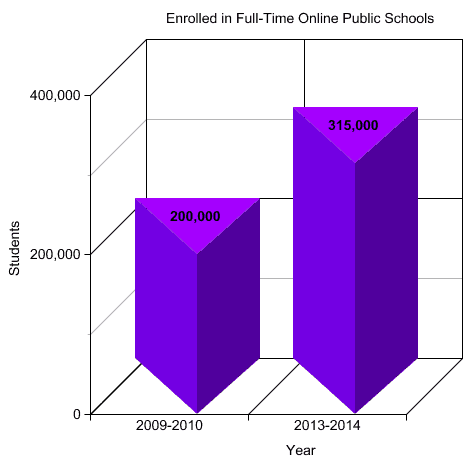Home School Programs
Best K-12 Homeschooling Programs
There are many types of home school programs that serve many purposes. These programs often offer anytime learning (online learning from anywhere in the world) and anytime enrollment (you can begin courses whenever you want during year-long open enrollment). In some U.S. states, a home school program is required as an accreditation and legal "umbrella" in order to home school.
Homeschooling is the fastest-growing form of education in the United States and is gaining popularity across the globe. In 1999, there were about 850,000 homeschooled students in the U.S. By 2011, the number of home educated students had more than doubled, reaching 1.77 million. In recent years, states like Florida have reported that their homeschooled population has been growing at rates of 9% each year.
There are many reasons why parents may not want their children enrolled in public schools. Many homeschools cite school safety/environment, drugs, peer pressure, and bullying as reasons why they chose to avoid the public school systems. Other families want to create an individualized curriculum and learning environment for their kids. A strong distaste for Common Core curriculum mandates is extremely common among homeschooled families.
However, there are many families that do not want to attend public schools but do not have the time or ability to create an individualized curriculum. This is where home school programs come into play.
What is a Home School Program?
"Home school program" is a lump term that refers to all types of external help with homeschooling. The what is homeschooling page explains the concept behind an "umbrella school" and "cover schools." Both of these schools fall under the broad umbrella of "home schooling program." These schools oversee homeschooling to ensure that homeschooled children fulfill the government educational requirements.
Home school programs include umbrella school, cover schools, online high schools, distance learning programs, virtual schools, cyber schools, learning centers, charter schools, college preparatory programs, and independent study programs. Yes--there are a lot of "creative names," and more popping up every day.
Finding an accredited online school/program that provides at-home education can be the best available option for some homeschooling families with hectic schedules.
The structure, variations, and types of home school programs
Homeschool programs are usually considered to be an alternative to both traditional public schools and a homeschool curriculum. Usually, home school programs are comprised of various curricula, methodology and accreditation, and a support staff. However, these home school programs have a great deal of variation.

Some programs are for specific grades, while others cover K-12. Some of these programs are essentially online curriculum, while others have much more teacher-student interaction. Some curriculum will combine online and offline resources, while others will be solely online.
Some programs are essentially online public schools because they are funded by tax dollars. Others are akin to a private school online.
Some virtual schools are sponsored by several different public schools. Some programs prep students for standardized tests, and others genuinely care about building a quality education.
How to Choose a Home School Program
An accredited school that provides an at-home education program can be a life changing opportunity for some families with busy schedules. Nevertheless, because of the variation in programs, it is important to be cautious and thorough in your research.
Every program will advertise their commitment to excellence, so it is important to read reviews and look for important qualities. Before beginning your search, know your child's needs and the important qualities you want.
Characteristics of the top home school programs
- Accreditation: Homeschool regulations and requirements are different for each state. If the program is not sponsored by your state government, make sure the program you're considering will fulfill local accreditation requirements.
- Managed or automatic record keeping: A top-notch record keeping system is essential for ensuring your legal safety, accreditation, and monitoring progress.
- A clearly defined/stated philosophy: Any program worth its weight will have an educational philosophy or method they follow.
- Open to feedback with a proven track record: Although there are new programs showing up yearly, the best programs have been refined over many years. The homeschooling program should always put the family first and not only be receptive to feedback but request constructive criticism.
- 24/7 access to materials: For many families that need a complete program, it is critical that their children's learning environments are flexible.
- A safe online environment: When considering an online homeschool program, safety should always be a major concern.
- Focus on learning: There are quite a few programs that focus on preparing their students for standardized tests with almost no emphasis on retention or learning.
- Convenient: If your homeschool program is not easy to use and convenient, it could be time to make a change. There are too many great programs out there to make sacrifices.
Checklist for picking a homeschooling programs
- Check for accreditation and that the school meets your state's standards
- Is the program nationwide?
- Find out how many years the program has been operating
- If your children want to attend college, make sure the program prepares high school students for higher ed.
- Ask how many students are enrolled - there are benefits to both small programs and large schools
- Confirm the program uses some type of standardized achievement testing
- Find out what academic support options are available
- Are they a K-12 program?

